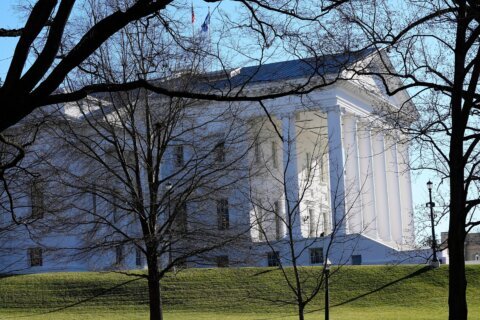WASHINGTON — Negotiations in Richmond over plans to toll rush-hour solo drivers on Interstate 66 inside the Capital Beltway could lead to construction of a new eastbound lane soon rather than later.
“I’m talking about actually in the law. I’m talking we need to see construction start before any tolls,” said Sen. Chap Petersen, D-Fairfax.
He said talks between Virginia Transportation Secretary Aubrey Layne and a bipartisan group of about a half-dozen senators representing commuters outside the Beltway are making progress. But a deal sealing the fate of tolls on the major commuter route might not be reached for weeks as lawmakers slog through numerous bills related to the I-66 corridor and tolls in general.
The group of senators is looking to speed up plans to construct a new eastbound lane between the Dulles Connector Road and Ballston. Existing plans wouldn’t study the widening project for another five years. Layne has said he expects widening that stretch of highway will be needed.
“When we started this conversation we were pretty far apart, and we took a couple jabs in the media, we threw a couple jabs back. But the bottom line is I’m trying to think of the long game, and the long game is I want to get something done on 66 and I want to have it happen this session,” Petersen said.
He also wants to codify other parts of the plan that would maintain free rides for as long as possible for vehicles with two people in the car. High occupancy vehicle restrictions are set to tighten in 2020 to require three occupants in the car.
Petersen also wants to guarantee that the I-66 toll revenue is only used along the interstate corridor for construction, operations and maintenance or transit. State law requires that toll revenue in Virginia benefit the toll payers.
Two administration officials told WTOP Thursday that a compromise would be nice, but there was nothing new to report at this point.
The McAuliffe administration is backing two bills introduced by Republican Del. Chris Jones, who chairs the powerful House Appropriations Committee, that would set a state tolling policy that would limit in some cases where tolls could be introduced in the future and offer new methods to track down or notify toll violators.
“I understand, and have been working with Del. (James) LeMunyon and others on the issues of inside the Beltway, and continue to do so, but this was seen as a statewide policy that our citizens can look at. There are exceptions (on I-66) inside the Beltway (and) Hampton Roads for the ability to continue to deliver (public-private) projects, HOT lanes. So this was not intended to stop or curtail any specific project, but to restrict the overall authority (to toll),” Layne told the House Transportation Committee.
Despite questions from that committee about why a ban on tolling existing lanes on Interstate 66 was not included in that bill, Petersen says he expects the I-66 issue to be handled separately because it is unique to Northern Virginia.
“There are some who can never vote for anything that spends a nickel, because they have taken the pledge. There are some who are going to vote no because they don’t want to do anything other than what they said they were going to do to stop tolls or this or that. This bill is dealing with the public policy of what the Commonwealth does on our interstate highways,” Jones says.
While the Senate could reach an agreement as early as next week, ahead of the deadline to pass bills that will be sent to the House, a final agreement might not be reached for several weeks.
“It’s gonna take a while. I think what will happen is you’ll see bills come out of the House and Senate, and go into conference. And my goal is to just have a seat at the table,” Petersen says.







